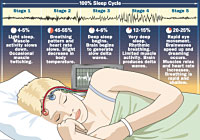To Sleep, Perchance to Dream - with Home Dialysis

Playwright Thomas Dekker once said "sleep is the golden chain that ties health and our bodies together." He was right: studies of people on dialysis show that people who sleep better tend to live longer. How can you sleep better? Home dialysis improves the sleep of many—and we'll share some sleep tips in this article.
The purpose of sleep
All mammals sleep, of course. But you may not know that sleep has also been found in fish, flies, and even worms. 1 Sleep fine-tunes your immune system and helps rebuild your nerves. And, many hormones are released during sleep. 2 We also know that:
- Poor sleep can hurt your heart.
- In a study of women aged 55-65, just 3 nights of 4 hours of sleep made cholesterol soar. 3
- Sleep is linked to obesity.
- In a study of 276 adults from Canada followed for 6 years, those who slept less than 7 hours—or more than 9—were much more likely to gain weight. 4
- Sleep loss raises type 2 diabetes risk in women.
- A study of 1,336 men and 1,434 women ages 45-74 in Finland found that women who slept for less than 6 hours—or more than 8—had a much higher risk of developing diabetes. This was true regardless of their age, weight, smoking, physical activity, and use of sleeping pills. 5
- Sleepiness impairs driving.
- Sleep loss slows reaction time, and raises the risk that a driver will cross the median line into oncoming traffic. 6
- Sleep affects mood.
- A large study in Sweden found that insomnia (trouble falling or staying asleep) was linked with depression and anxiety, and vice versa. 7
- Lost sleep, lost memories.
- Memories "lock in" during sleep, so poor sleep can lead to poor memory. 8 (As we age, most of us become lighter sleepers—and more forgetful, too.)
Sleep cycles

Sleep is a complex state with five stages. In Stage 1, you feel drowsy. This lasts for a few minutes. Stage 2 is light sleep—your eye movements stop and your pulse and temperature drop. Stages 3 and 4 are deep sleep. More blood goes to your muscles and less to your brain. This is when hormones are made and your body repairs itself. If you wake during this stage, you feel groggy. Deep sleep is the most important part of the cycle. Stage 5 is rapid eye movement (REM) or "dream sleep." In REM sleep, we process what we learned each day and puzzle out problems. Each night, most of us have 3-5 REM cycles. 2
CKD and sleep problems

Sleep problems are very common for people on dialysis, but the trouble seems to start while their kidneys are failing. In a study of 100 people with chronic kidney disease (CKD), 89% said they had some sort of sleep concerns. 9 Types of sleep problems in CKD include trouble falling asleep, waking during the night, nightmares, restless legs syndrome, and sleep apnea (stopping breathing many times while sleeping—a problem that is strongly linked with a higher risk of heart disease). 10
People who do standard, three-times-a-week in-center hemodialysis (HD) report sleep problems. A study of 11,351 people on standard HD asked if they felt sleepy during the day, felt drained or woke up at night. The researchers found that 49% had poor sleep quality, which was linked to lower quality of life and a 16% higher risk of death. 11 Pain 12 or itching 13 (which is itself a form of pain) made good sleep a challenge.
Changing the treatment shift time for standard in-center HD may help in some cases. One study found that people slept better if they dialyzed in the evening; 14 another found no change. 15
Using cooler dialysate (35°C instead of 37°) helped people on HD sleep longer and better the night after a treatment. 16
If you have trouble falling asleep, some non-medical tips that may help include:
- Take a hot shower or bath before bed.
- When your body cools off after you get out, it can help you sleep better.
- Try aromatherapy.
- Spritz your pillow with lavender or use a sleep mask filled with lavender flowers.
- Write a to-do list.
- If your brain won't shut off, it can help to let go of things you need to do tomorrow by writing them down.
- Listen to soft music.
- Keep the volume very low, and music may help you drift off.
- Meditate to sleep.
- Count each breath—in and out. Start from 1,000 and count backwards. If you like, you can do this to a favorite song.
- Set up a routine.
- A series of I'm-going-to-sleep steps will help you wind down.
Peritoneal dialysis (PD) and sleep
In a study of 124 people on PD, 43.5% said they had poor sleep quality, and those who did were more prone to depression. 17 PD and in-center HD have about the same level of sleep problems. 18 If you are on PD and have sleep apnea, using a cycler may help. A study done in a sleep lab compared people doing CAPD and CCPD. CCPD removed much more water from the blood. Only 4.2% of people had sleep apnea on CCPD vs. 33.3% on CAPD. 19

Of course, it can take time to get used to sleeping with a PD cycler going. The cycler can wake you up with alarms, or the feeling of the fluid flowing in and out. You may even need to get used to a new sleep position if you slept on your stomach before. Using a PD belt can help make the catheter more comfortable at night when you sleep. In time, you may reach the point where the cycler's swooshing noises help you fall asleep. A cycler should not squeak or squeal—if yours does, it may need repair or replacement.
Home hemodialysis and sleep quality
At this time, there are no studies on sleep and short daily HD (SDHD). But a couple of small studies have found that nocturnal HD (NHD) can improve sleep, if you can sleep through it in the first place. Recent research has found that the throat can actually become more narrow with ESRD, which can cause or worsen sleep apnea. 20 Switching from standard HD to nocturnal home HD (NHHD) was linked with the throat becoming wider again. In this study (of 24 people), 3 had less sleep apnea after starting NHD. 21
NHHD may improve sleep in a second way, too. A hormone called melatonin helps your body sort out day from night. It helps you to become sleepy when it's bedtime. In people on standard HD, the melatonin rhythm is disturbed. Among 13 people who switched to NHD, this rhythm was partly restored after 6 months of treatment, and their sleep quality was much better. So, hanging in there for a few months may help if you have trouble sleeping at first on NHD. 22
Learning to sleep on NHHD is like learning to sleep with a PD cycler—with the added concern of having the blood out of the body. Make sure the needles and blood lines are secure and well-taped to help ease your mind. Put a bedwetting alarm under the dialyzer and under the access. This can give you an instant warning in case something goes wrong. Some people cover the machine screen with cardboard to darken the room (a sleep mask can have the same effect).
Conclusion
Sleep problems are common for people on dialysis. Small studies suggest that getting more treatment may also help you to get better sleep. Sweet dreams!
References:
- Allada R, Siegel JM. Unearthing the phylogenetic roots of sleep. Curr Biol. 2008 Aug 5;18(15):R670-R679.
- Sleeping well: What you need to know (sleep requirements, needs, cycles, and stages).
- Kerkhofs M, Boudjeltia KZ, Stenuit P, Brohee D, Cauchle P, Vanhaeverbeek M. Sleep restriction increases blood neutrophils, total chelesterol and low density lipprotein cholesterol in postmenopausal women: A preliminary study. Maturitas. 2007 Feb 20;56(2):212-5.
- Chaput JP, Despres JP, Bouchard C, Tremblay A. The association between sleep duration and weight gain in adults: a 6-year prospective study from the Quebec Family Study. Sleep. 2008 Apr 1;31(4):517-23.
- Tuomilehto H, Peltonen M, Partinen M, Seppa J, Saaristo T, Korpi-Hyovalti E, Oksa H, Puolijoki H, Saltevo J, Vanhala M, Tuomilehto J. Sleep duration is associated with an increased risk for the prevalence of type 2 diabetes in middle-aged women—the FIN-D2D survey. Sleep Med. 2008 Mar;9(3):221-7. Comment in Sleep Med. 2008 Mar;9(3):219-20.
- Philip P, Sagaspe P, Taillard J, Valtat C, Moore N, Akerstedt T, Charles A, Bioulac B. Fatigue, sleepiness, and performance in simulated versus real driving conditions. Sleep. 2005 Dec 1;28(12):1511-6.
- Jansson-Frojmark M, Lindblom K. A bidirectional relationship between anxiety and depression, and insomnia? A prospective study in the general population. J Psychosom Res. 2008 Apr 64(4):443-9.
- Hornung OP, Regen F, Danker-Hopfe H, Schredl M, Heuser I. The relationship between REM sleep and memory consolidation in old age and effects of cholinergic medication. Biol Psychiatry. 2007 Mar 15;61(6):750-7.
- De Santo RM, Cesare CM, Bartiromo M, Cirillo M. High prevalence of sleep disorders at the time of CKD diagnosis. J Renal Nutr. 2008 Jan;18(1):104-6.
- Gusbeth-Tatomir P, Boisteanu D, Seica A, Buga C, Covic A. Sleep disorders: a systematic reiew of an emerging major clinical issue in renal patients. Int Urol Nephrol. 2007;39(4):1217-26.
- Elder SJ, Pisoni RL, Akizawa T, Fissell R, Andreucci VE, Fukuhara S, Kurokawa K, Rayner HC, Furniss AL, Port FK, Saran R. Sleep quality predicts quality of life and mortality risk in haemodialysis patients: results from the Dialysis Outcomes and Practice Patterns Study (DOPPS). Nephrol Dial Transplant. 2008 Mar;23(3):998-1004.
- Davison SN, Jhangri GS. The impact of chronic pain on depression, sleep, and the desire to withdraw from dialysis in hemodialysis patients. J Pain Symptom Manage. 2005 Nov;30(5):465-73.
- Pisoni RL, Wikstrom B, Elder SJ, Akizawa T, Asano Y, Keen ML, Saran R, Mendelssohn DC, Young EW, Port FK. Pruritus in haemodialysis patients: International results from the Dialysis Outcomes and Practice Patterns Study (DOPPS). Nephrol Dial Transplant. 2006 Dec;21(12):3495-505. Comment in Nephrol Dial Transplant. 2007 Dec;22(12):3669-70.
- Hsu CY, Lee CT, Lee YJ, Huang TL, Yu CY, Lee LC, Lam KK, Chien YS, Chuang FR, Hsu KT. Better sleep quality and less daytime symptoms in patients on evening hemodialysis: a questionnaire-based study. Artif Organs. 2008 Sep;32(9):711-6.
- Bastos JP, Sousa RB, Nepomuceno LA, Gutierrez-Adrianzen OA, Bruin PF, Araujo ML, Bruin VM. Sleep disturbances in patients on maintenance hemodialysis: role of dialysis shift. Rev Assoc Med Bras. 2007 Nov-Dec;53(6):492-6.
- Parker KP, Bailey JL, Rye DB, Bliwise DL, Van Someren EJ. Insomnia on dialysis nights: the beneficial effects of cool dialysate. J Nephrol. 2008 Mar-Apr;21 Suppl 13:S71-7.
- Guney I, Biyik M, Yeksan M, Biyik Z, Atalay H, Solak Y, Selcuk NY, Tonbul HZ, Turk S. Sleep quality and depression in peritoneal dialysis patients. Ren Fail. 2008;30(10):1017-22.
- Eryavuz N, Yuksel S, Acarturk G, Uslan I, Demir S, Demir M, Sezer MT. Comparison of sleep quality between hemodialysis and peritoneal dialysis patients. Int Urol Nephrol. 2008;40(3):785-91.
- Tang SC, Lam B, Ku PP, Leung WS, Chu CM, Ho YW, Ip MS, Lai KN. Alleviation of sleep apnea in patients with chronic renal failure by nocturnal cycler-assisted peritoneal dialysis compared with conventional continuous ambulatory peritoneal dialysis. J Am Soc Nephrol. 2006 Sept;17(9):2607-16.
- Beecroft JM, Hoffstein V, Pierratos A, Chan CT, McFarlane PA, Hanley PJ. Pharyngeal narrowing in end-stage renal disease: implications for obstructive sleep apnoea. Eur Respir J. 2007 Nov;30(5):965-71.
- Beecroft JM, Hoffstein V, Pierratos A, Chan CT, McFarlane P, Hanley PJ. Nocturnal haemodialysis increases pharyngeal size in patients with sleep apnoea and end-stage renal disease. Nephrol Dial Transplant. 2008 Feb;23(2):673-9.
- Koch BC, Hagen EC, Nagtegaal JE, Boringa JB, Kerkhof GA, Ter Wee PM. Effects of nocturnal hemodialysis on melatonin rhythm and sleep-wake behavior: An uncontrolled trial. Am J Kidney Dis. 2008 Oct 23 [Epub ahead of print].

